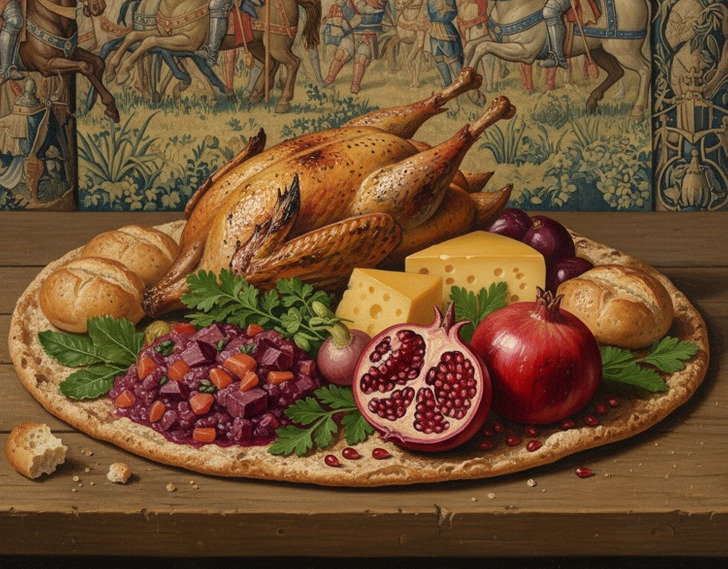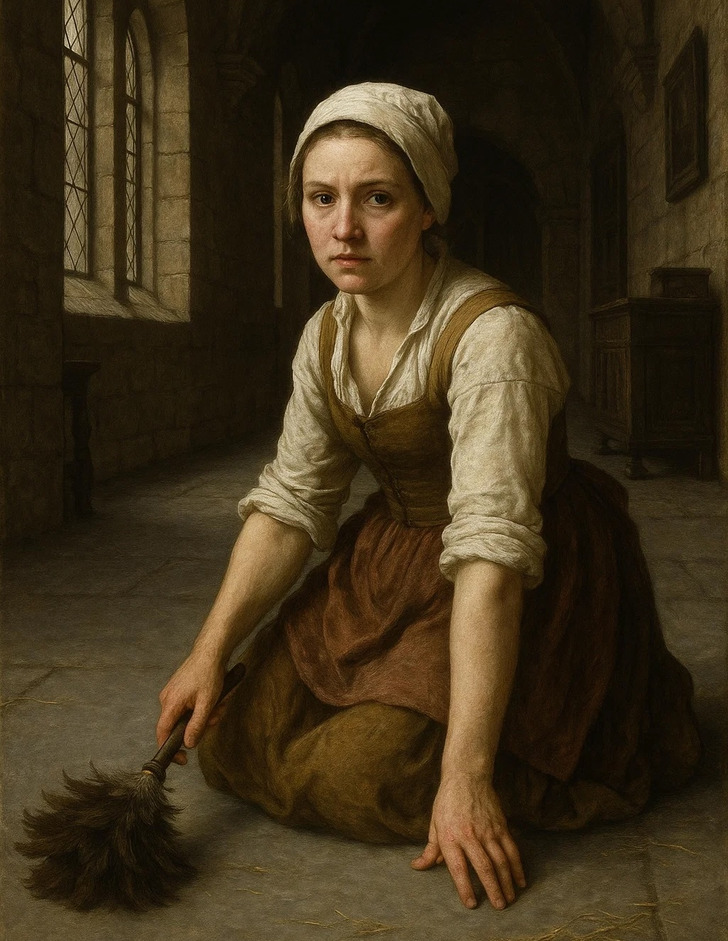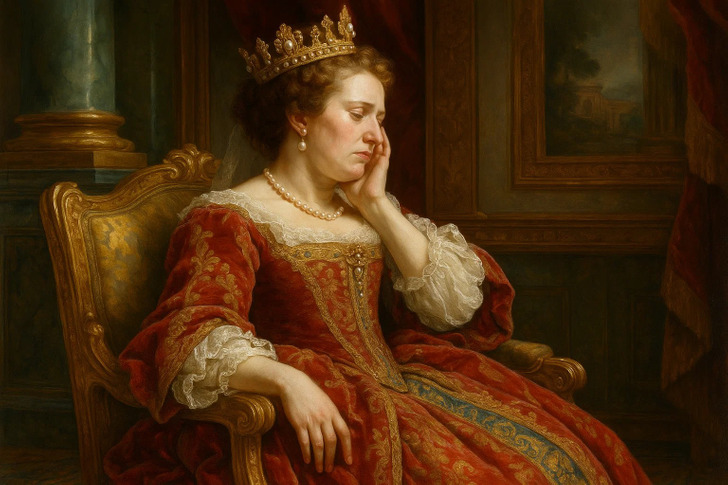I used to think I could never earn more than what my previous employer paid me — but I was wrong. The world is full of opportunities for those willing to take a chance.
Now, I’m earning $52 per hour or more, and I can easily make at least $1,300 a week. Based on my experience, I believe everyone should try working online — it’s a simple and flexible way to earn money. Here's an example:>>>sfsdffs>>>>>>Www.Richnow1
10 Realities of Aristocrat Life That Weren’t as Magical as We Thought

Throughout all times, there have been wealthy and noble people who could afford more than everyone else. Yet, their life was not so sweet: strict rules, strange laws, and domestic challenges affected them too. Sitting next to your husband at a party or wearing a dress in the color you like seems easy to us, but for the aristocrats of the past, things like this were sometimes impossible. Just read on.
In the Middle Ages, food was served not on a plate, but on stale bread.

Even if you were a noble person in the Middle Ages, you still might not have gotten a proper plate! Instead, your food would be served on a stale slice of bread called a “trencher.” After the meal, it could be soaked in sauce and eaten, or given to servants or poor people as a form of charity.
Over time, the term “trencher” came to refer to a flat, rimless dish made of metal or wood. Similar dishes are still in use today, for example, for serving cheese platters.
They didn’t wash the floors in medieval homes.

And all because these floors were simply beaten earth. A floor could be plastered or stone, but in any case, it was strewn with reeds and straw. In spring and summer, flowers and herbs were added to mask unpleasant odors. The floors were quite dirty since this flooring was changed rather infrequently, by sweeping away the old straw with makeshift tools like bird feathers.
Tile floors, especially those decorated with clay, were only available to the wealthy people, as their production was very labor-intensive.
They visited a barber instead of a dentist.

No matter how much money you had, it didn’t guarantee you quality dental care. Up until the 17th century, there were barber-surgeons who not only took care of haircuts and shaves but also performed minor surgical procedures. And even if you were of royal blood and had a toothache, there was only one solution — to have it extracted by this specialist.
Wearing certain clothing was prohibited by law.

Since the Middle Ages, many countries have had sumptuary laws that prohibited wearing certain types and colors of fabrics, furs, trims, and embellishments, as well as flaunting their wealth and status through appearance. However, many people ignored these regulations.
People had to dress in strict accordance with their social standing. For instance, in the 17th-century France, Louis XIII decreed that only princes and nobility could wear gold embroidery and lace-trimmed collars and cuffs. In the Victorian era, in order to be presented to the queen, women had to be dressed in a white gown with a tuft of 3 ostrich feathers in their hair, and no other way.
Not following etiquette could cost you your reputation.

In 19th and early 20th century Britain, social events for the upper class were governed by strict rules. Dipping bread in sauce, holding cutlery incorrectly, or engaging in controversial conversations all meant you would be considered extremely ill-mannered. Offenses like this could result in you not being invited again anywhere.
During formal dinners, guests followed a precise seating plan — don’t even dream of sitting next to your spouse or best friend! Sitting correctly was also essential: you had to keep your back straight without touching the back of the chair under any circumstances.
During the meal, you were allowed to converse with one guest to your left or right, as decided by the hostess. When she turned to another guest or gently coughed, it signaled to the other guests that they could also change conversation partners. This was known as the “turn of the table.” It was considered unacceptable to leave for the restroom during dinner, which could last for quite awhile.
Rules restricted women just like a corset.
The life of English ladies in the early 19th century was governed by numerous rules, the breach of which could lead to being branded as uncouth and bold, or even permanently tarnished. The etiquette manuals of those years listed, for instance, the following requirements:
Maintaining good posture and always keeping a straight back was essential. If a lady witnessed profanity or bad manners, it was considered appropriate to faint.
Approaching familiar men on the street was prohibited — they were expected to approach. However, a lady was forbidden from conversing with a man unless accompanied by another lady, a male relative, or at least a servant. Talking to someone who had not been previously introduced was not allowed, yet ignoring someone who had been introduced was also unacceptable.
At a ball, dancing more than one dance with the same man was not permitted, and after dinner, ladies were expected to retire to another room so as not to disturb men who were having serious conversations.
They spent a fortune on feasts.
Throughout the centuries, lavish feasts for noble families were not merely entertainment. They were a way to showcase wealth and status, which is why aristocrats splurged immense sums on these events, leading some of them to financial ruin.
The symbol of excess and luxury was the 18th-century Versailles. The extravagant balls there consumed incredible amounts of money, and the obligation to appear in expensive attire nearly bankrupted many noble families.
Social life was exhausting.

The season of formal dinners and balls in the upper echelons of European society lasted several months and the schedule was hectic: the cream of the aristocracy had to attend 2-3 events a week, as well as host such gatherings themselves.
Participating in this whirlwind of events was challenging both financially and psychologically. The only ones who felt carefree were the merchants of luxury goods and fashionable dresses, which were purchased throughout the season in huge quantities. One could take a break from it all in summer when most aristocratic families moved to their country estates.
Unlike the lower classes, nobles rarely married for love.

People who belonged to the upper class of England during Shakespeare’s time were much less free in choosing a partner than those who were lower on the social ladder. Arranged marriages were common and aimed primarily at strengthening family wealth and connections with influential people. Girls who disagreed with their father’s decision risked being rejected by their own parents.
Even kings found it hard to find solitude.

Even the European monarchs of the 16th-17th centuries had to wake up and go to sleep in the presence of a crowd. Attending the king's dressing ceremony required a special invitation, and while servants put on his stockings and wig, he would receive petitions and resolve the courtiers' disputes. Some members of the nobility followed this tradition too, combining their morning routines with the reception of their close associates.
During the time of Louis XIV, the monarch's meals were also a public affair. Such a public meal was called a grand couvert: the nobility would gather to watch the king consume various delicacies. This ritual demonstrated royal power and showed the public that the king was so occupied with state affairs that he couldn't even eat alone.
And here are facts about the Middle Ages that school history teachers keep silent about.
Comments
Related Reads
I Absolutely Refuse to Let My Mom Move in After Discovering Her Real Motive

My DIL Charges Me for Toilet Paper When I Babysit—in My Son’s House

I Refuse to Lose My Inheritance Just Because I’m Childfree

My Son Chose His Stepmom Over Me, and the Reason Still Haunts Me

My SIL Is Ruining My Life and Marriage, So I Plotted the Perfect Payback

I Refused to Beg My DIL for Forgiveness—Then Suddenly She Needed Me

I Refuse to Let My Stepdaughter Mock My Menopause, So I Gave Her a Reality Check

10 Sassy Comebacks That Silenced Rooms in a Second

10 Stories That Prove Kindness Shines Through Even in the Darkest Times

A Store Worker Mocked My Mom’s Accent—My Clapback Was Brutal, Maybe Too Brutal

15 Stories That Prove Kindness Isn’t Weakness, It’s Inner Fire

My Sister Forbade My Wheelchair at Her Wedding—She Wasn’t Ready for My Payback


